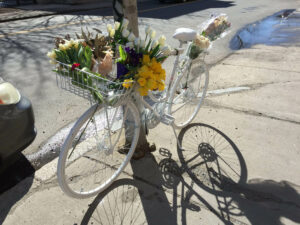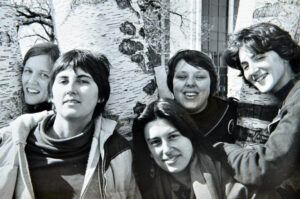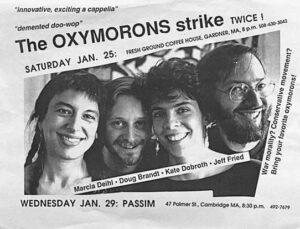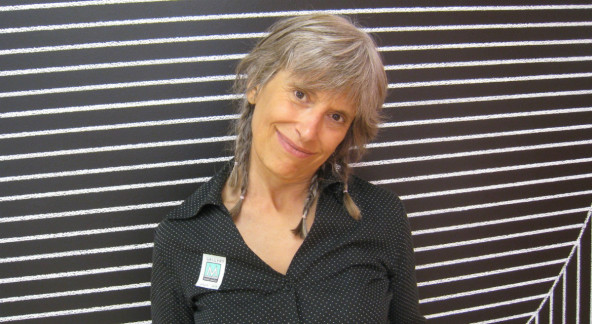By Robyn Ochs
It is with great sadness that I write about the untimely death of BBWN co-founder Marcia Deihl at age 65.
Marcia was a Cambridge activist who died as she lived: keeping her carbon footprint small on a quirky, old three-speed bicycle adorned with a basket and streamers. She was hit by a truck on Putnam Avenue on the afternoon of March 11. She had just finished her grocery shopping and had probably spent considerable time in the produce section, finding the biggest, most beautiful pieces of fruit in the store. She allowed herself one piece of fruit with her lunch, so the ones she selected had to be just right – and as large and as tasty as possible.
My life first intersected with Marcia’s in September of 1982. I had been living in Boston for only two weeks and found a listing in Sojourner, the women’s weekly, for a “Women’s Rap” at the Women’s Center in Cambridge. Topics varied, and the topic for this particular week was bisexuality. Starving for affirmation and community, I showed up, as did 19 other women. A few memories stand out: most of us reported having felt isolated, alone, and extremely rare, and for all of us this meeting was transformative. I remember tears and enormous grins. I remember feeling a profound sense of relief. Toward the end of the meeting, Marcia stood up and announced that she had been in a short-lived bi support group a couple of years back and was wondering if others in the room might be interested in joining her in starting a new one.
I was in! Marcia and I – along with six other women – became the BiVocals. We met monthly for a decade. We were very different people who fiercely affirmed each other’s bisexual identities, providing a safe haven in a sea of external biphobia and bi erasure. In 1983 we helped two more support groups form, and then, together we all co-founded the Boston Bisexual Women’s Network and this publication.
Marcia was an amazing and accomplished woman. For a self-described introvert or “cave pony,” Marcia was very involved in music, in writing and in her community.
She identified as an artist – or “oddest” – she would say, with a wink and a smile. Like me, Marcia worked a job to pay the bills so that she could follow her passions “after hours.” And then there was everything else she did:
Marcia was a learner.
She had a bachelor’s degree in music history and education from Boston University, a master’s degree in feminism and folk music from the Cambridge-Goddard School for Social Change, and a certificate in publishing and communications from Harvard University.
Marcia was a musician.
A songwriter, singer, fiddler and guitarist, Marcia performed in several groups over the years, including the New Harmony Sisterhood Band, formed in the mid-seventies, which released one album, …And Ain’t I a Woman? Marcia was in the Oxymorons, a four-person group that performed “innovative, exciting a capella” and “demented doo-wop.”
She hosted annual “Bizarre Song Parties,” in which guests were invited to bring and perform strange songs. Among my personal favorites: “Trauma to the Kitty and Dreams of the Everyday Housecat,” “People’s Planet,” “Chevrolet Chevrolah!” and “The Ants (Are Blowing in the Wind).”
She could also play a three-part round by simultaneously humming, whistling and playing a recorder through her nose. Yes, really. She would do this upon request – it was amazing!
Marcia was a writer.
In addition to writing songs, Marcia wrote in her journal daily since she was 12 and was working on a memoir. She was part of a community-based writers’ group.
She also contributed several pieces to Cognoscenti that can be found here: http://cognoscenti.wbur.org/2015/03/12/reflections-on-a-good-life-marcia-deihl; and she was a prolific writer of letters to the editor, to the extent that the Boston Globe ran an article after her death entitled “Marcia Deihl, the letter writer.” (http://www.bostonglobe.com/opinion/2015/03/17/marciadeihl-letter-writer/fhlpt0b7kRvHjUpSxZHI8K/story.html)
Deborah Silverstein, a fellow member of the New Harmony Sisterhood Band, wrote of Marcia: “She was an archivist, in her own personal way, archiving our generation and her piece of it. I think she had the mind and the spirit of a historian, and she knew that we’d lived on the front lines of a revolution.”
Marcia was an activist.
At Harvard University, from which she retired in 2012, after working for 30 years (we overlapped there for 25 of these years), she was active in her union, the Harvard University Clerical and Technical Workers. We were both also involved in LGBT activism: the Lavender Lunches, the LBQ Women’s Lunches (and their earlier incarnation as Sisters of Agnes). We were among the founders of the LGBT Faculty and Staff Group and its predecessor, the LBG Issues Network.
In the community, we were among the founders of the Cambridge Lavender Alliance and – of course – BBWN.
Marcia was an active member of Old Cambridge Baptist Church, where she sang in the choir and was active in their racial justice committee. She volunteered for – and donated to – the Theater Offensive, an LGBT theater company in Boston that includes programs for youth. She also donated money to MassEquality and to BBWN.
She showed up.
Marcia was a friend.
Marcia knew a lot of people in so many different circles. I was always impressed by her calm acceptance of others and their foibles. She was brilliant and ironic but never mean.
She sometimes called herself “Marsha Mellow-D.” Her niece and nephew called her “Auntie Martian.” She loved that.
She will be missed. I will miss her.

The Cambridge/Boston biking community placed a memorial bicycle at the site where Marcia Deihl was struck while riding home from the store.

Marcia was a member of the New Harmony Sisterhood Band that started in the 1970s. The band sang at her memorial service at Old Cambridge Baptist Church in April.

Marrcia sang for many years with the Oxymorons, an a capella group.

